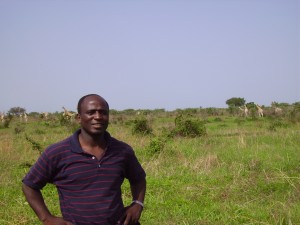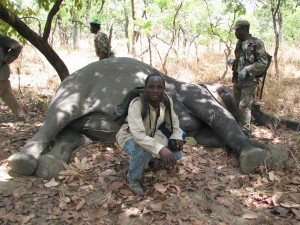
Samuel Tsakem
PhD. Student
Contact Information
Lecturer, Garoua Wildlife School
P.O. Box 271 Garoua, Cameroon
Phone 00237 22103063
Cell 00237 97692181
Email ctsakem@yahoo.fr
Education
2011-present: Ph.D Student at ERAIFT/UNESCO (École Régionale Post-Universitaire d’Aménagement et de Gestion Intégrés des Forêts et Territoires Tropicaux), University of Kinshasa, Congo Democratic Republic
2007-2009: Master in Development Studies, University of Geneva, Swizerland
2005-2006: Master in Management of animal and plant resources in tropical environments, University of Liege, Belgium
1994-1999: Ingenieur des Eaux, Forets et des Chasses, University of Dschang, Cameroon
My Project
Ecological aspects of great apes in the Lobéké National Park (Cameroon) and its surroundings: implications for conservation
Background
Faced with the growing threats on biological resources, and given that these resources often overlap several coutries making management difficult, , the governments of Cameroon, Central African Republic and Congo have established a Transboundary Protected Area, the Tri National Sangha (TNS). This site presents a very rich biodiversity including two species of great apes: gorillas (Gorilla gorilla gorilla) and chimpanzees (Pan troglodytes). Despite this potential, conservation efforts are being made by those involved in conservation without limiting anthropogenic pressures of all kinds: e.g. commercial hunting, poaching, logging, shifting cultivation and so on. Limiting anthropogenic pressures would have considerable influence on the ecology of wildlife. With the goal to increase our knowledge of the resources and in order to consider their sound management, the PACEBCo (Programme d’Appui à la Conservation des Écosystèmes du Bassin du Congo) took the initiative to partially support this research in the Lobéké National Park, located in southern Cameroon.
Field work
We will collect data in the Lobéké National Park. The fieldwork will consist of making an inventory of the great apes to assess their density an
d structure, and to follow a few individuals to record their foraging behaviour and habitat use. In addition, we will conduct interviews with various stakeholders, including locals, to better understand the interactions between humans and apes.
Objectives
Contribute to a better understanding of great apes in the Lobéké National Park (Cameroon)
1. Determine the current status of great apes in NLP and their spatial distribution
2. Determine / study the foraging behavior and diet of great apes and the factors influencing their behavior
3. Describe the ape-man interactions and their implications for conservation.
Publications
- S.C. Tsakem*, M.N. Tchamba & R.B. Weladji (2015) Les gorilles du Parc National de Lobéké (Cameroun): interactions avec les populations locales et implications pour la conservation. Int. J. Biol. Chem. Sci. 9(1): 270-280
- S.C. Tsakem*, M.N. Tchamba & R.B. Weladji (2014) Les Gorilles du Parc National de Lobéké, (Cameroun) : Utilisation de l’habitat et Implications pour la conservation. Parcs et reserves 69:15-25